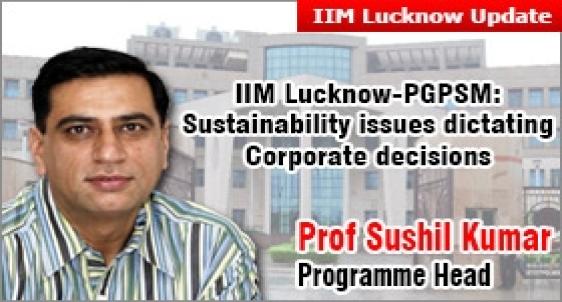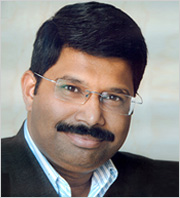
MBA education in India is taking new turn and is no more confined to conventional General Management or Business Management domains. In fact there are more sustainability issues being faced by corporate sector which requires management experts to take appropriate decisions and keep balance between business and social responsiveness.
Taking the lead to address the various sustainability issues and challenges, IIM Lucknow has started Postgraduate Programme in Sustainable Management (PGPSM) at its Noida campus. The programme is designed to produce experts in the area. MBAUniverse.com interviewed Professor Sushil Kumar who heads the Centre for Business Sustainability in the Indian Institute of Management (IIM) Lucknow. Prof. Kumar conducts Management Development Programmes on Inspired Leadership; General Management; Creativity and Innovations; Leadership in Education; Corporate Social Responsibility; Change Management and Effective Organizational Culture.
Prof Kumar is a faculty member of Centre for Food and Agribusiness Management (CFAM) and Human Resource Management group. Prior to joining IIM Lucknow in April 2005, he was SSHRC postdoctoral fellow at the University of Toronto, Toronto (Canada) from where he completed his Doctoral studies too. Earlier, he was a Member of the prestigious All India Service - Indian Forest Services (IFS) - belonging to the 1988 batch. He has worked as Dean, School of Management, and Dean, Academics at Gautam Buddha University during 2009 for one year and Dean (Academic Affairs) at IIM Lucknow for three years.
At IIML, Prof. Kumar teaches Systems Thinking; Creativity and Innovations; Principles of Sustainable Management; Social Entrepreneurship and Innovations; Business Sustainability & Externalities Markets; Values and Ethics; Contemporary Strategic Issues in Agribusiness and Food Industry; Research Methods and; Structural Equation Modeling.
Prof. Kumar possesses an expert level knowledge of various technical, managerial, socio-economic, institutional, and cultural issues in these fields. As a consultant, Prof. Sushil Kumar has worked with ‘gtz’, World Bank, UNICEF, Government of India, and Government of UP in number of consulting assignments in the field of corporate planning, rural development, health management, and monitoring and evaluation.
Edited excerpts of the interview follow:
When was this program launched, what is the rationale and for whom the programme is targetted?
PGPSM was launched in the year 2015. Public awareness about environmental degradation, global warming, climate change, and socio-economic implications of corporate action have increased remarkably in recent times. This has radically transformed business paradigms around the world. The Sustainability agenda has received a major push because of voluntary norms and proactive steps taken by some industry associations. Businesses are increasingly aligning their vision and strategies with national and global Sustainable Development objectives.
In such a scenario, Sustainability issues are dictating corporate decisions and there is a demand for MBA graduates who not only understand such challenges but are also adept at making decisions that maintain the fine balance between financial, environmental and social responsiveness. IIM Lucknow, fully understanding the need to produce such experts, took the timely initiative to launch a Postgraduate Programme in Sustainable Management (PGPSM) at its Noida campus.
PGPSM is targeted at working professionals having minimum experience of two years.
What is the batch profile of 2015-17 batch and 2016-18 batch? Kindly share
The 2015-17 batch has an average work experience of 4.5 years. In addition to entrepreneurs, we have professionals who have worked in sectors like IT, Sales and Marketing, Operations, Healthcare, Consulting and Banking.
The 2016-18 batch has an average work experience of 4 years. Students have worked in varied sectors like Analytics, Education, Energy, Engineering and construction, IT, Marketing, Operations and Telecom.
What are the Placement Prospects for candidates graduating with this program?
PGPSM students have the ideal blend of past academic qualification, work experience and exposure to Management and Business Sustainability issues. Their grounding in sustainability is further strengthened by the nine month long Integrated project which lets them experience first-hand and resolve sustainability challenges in the corporate sphere. This opens opportunities for them in industry, consultancies, regulatory agencies, governmental and non-governmental organizations.
Companies having divisions like sustainability, environment, climate change, energy, green products and those in the social sector could be prospective recruiters.
We understand the recent Summer Placements for 2015-17 batch have been good with participation from 13 firms, and 26 offers for 19 students. Tell us more about it.
We have had two successful rounds of Summer Placements. Internships have been offered by a wide range of companies from various sectors.
Mahindra, Tata Sustainability Group, Wipro, Cairn Energy, PwC, KPMG, Azim Premji Foundation, Wipro Earthian-CSTEP, BIOME, Valluri Technology Accelerators, Sweep Enviro, UPL and Biocon are some of the companies that have offered varied roles in sustainability.
These have been in the domain of renewable energy solutions, smart city consulting, sustainability reporting, rural development, social and community inclusion, corporate social responsibility, environment, waste management, carbon neutrality and pricing.
What are the Final Placements prospects for the 2015-17 batch?
The on-going final placements have received enthusiastic response from industry. PGPSM students have either been offered jobs or are being considered by leading companies including Mckinsey, Ernst and Young, Accenture, PwC, KPMG, Vikram Solar, Mytrah Energy, H & M, UMTC, Cargill Foods, Vallury Technology Accelerators, Mahindra etc.
What are the important dates for Admissions 2017? Please share?
The deadline for uploading the Special Form for PGPSM, which was initially 30th January 2017, was extended to 5th February 2017. The WAT-PI process will start on 9th February, 2017 and end on 3rd April, 2017.
What is your message to MBA aspirants who have written CAT 2016, and are looking at options beyond the obvious MBA programs?
In modern day world with unprecedented uncertainty and complexity, in order to be successful, one must carve a niche for oneself by developing deeper knowledge. No doubt, broad understanding of all management concepts is essential, however, at the same time it is also essential that one must try to look beyond obvious and familiar options. And, there are many such options which are being offered by some leading management Institutes across the globe. MBA programme on Business Sustainability or Sustainable Management is one such option which not only prepares a student to face and resolve the familiar management challenges but also helps develop a futuristic vision.
Stay tuned to MBAUniverse.com for more updates on IIM Lucknow-PGPSM Programme



























